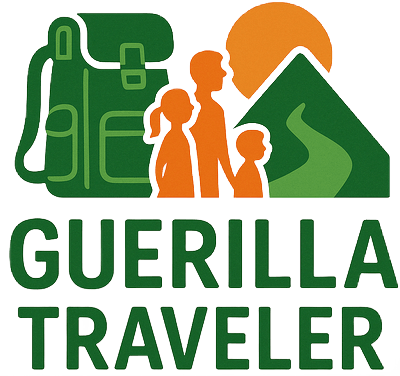Family Travel to China: Basic Chinese Phrases to Learn
Planning a family trip to China? Unlock a richer experience by learning basic Mandarin! From simple greetings like “nǐ hǎo” (hello) to essential phrases for dining, transportation, and even haggling, this guide equips you with the language tools to navigate China with confidence. Discover how a few key phrases can enhance your family’s adventure, fostering connections with locals and creating unforgettable memories. Start learning today and transform your China trip from ordinary to extraordinary!
Important information

- Start with greetings: “Nǐ hǎo” (Hello) and “Xièxie” (Thank you).
- Learn key phrases: “Wèishēngjiān zài nǎlǐ?” (Where is the toilet?), “Duōshǎo qián?” (How much is this?), and “Néng bāng wǒ ma?” (Can you help me?).
- Dining basics: “Wǒ yào zhège” (I want this one), “Wǒ bù chī ròu” (I don’t eat meat), and “qǐng gěi wǒ càidān (Please give me the menu).
- Transportation: “Dìtiě” (Subway), “Gōnggòng qìchē” (Bus), and “Chūzū chē” (Taxi).
- Haggling: “Tài guì le!” (Too expensive!) and “Kěyǐ piányi yīdiǎn ma?” (Can you lower the price?).
Basic Mandarin Chinese Phrases for Family Travel to China
Learning some basic Mandarin can greatly enhance your family trip to China, allowing you to connect with locals and immerse yourselves in the culture. Start with simple greetings like “nǐ hǎo” (hello) and “xièxie” (thank you). These small gestures can make a big difference. Learning practical phrases, such as “wèishēngjiān zài nǎlǐ?” (where is the toilet?) or basic directional questions, will simplify navigation. Dining phrases are also valuable, enabling you to order food and express gratitude with ease. Knowing a few emergency terms can provide added security. Learning numbers will empower you to confidently navigate market transactions and haggling. For more complex communication, consider using a translation app or carrying a phrasebook.
Learn basic greetings. Start with “nǐ hǎo” (hello) and “xièxie” (thank you).
Learn practical phrases. Examples include “wèishēngjiān zài nǎlǐ?” (where is the toilet?) and basic directional questions.
Learn dining phrases. These will help you order food and express gratitude.
Learn a few emergency terms. This can provide added security during your trip.
Learn numbers. This will help you navigate market transactions and haggling.
For more complex communication, use a translation app or carry a phrasebook.
Understanding the Importance of Basic Phrases
Planning a family trip to China? Learning some basic Mandarin can significantly enhance your experience. Simple greetings can forge connections with locals, while essential phrases will make navigating public transport, ordering food, and shopping a breeze. Knowing some Mandarin is also helpful in hotels and can even prove crucial during emergencies. A little language preparation can transform your China trip into a smoother, more enjoyable adventure. Here’s why you should consider learning some basic Mandarin:
Connect with Locals
Even a few basic Mandarin phrases can create a positive impression and lead to more meaningful interactions with locals.
Navigate with Ease
Knowing key phrases for directions, transportation, and ordering food will simplify your daily adventures.
Enhance Safety
In emergencies, knowing how to ask for help or explain your situation in Mandarin can be invaluable.
Enjoy a Richer Experience
Learning some Mandarin demonstrates respect for the local culture and opens doors to a more immersive and authentic travel experience.
Chinese Phrases for Greetings and Courtesy
Learn basic Mandarin Chinese greetings. Say “Nǐ hǎo” (你好) for “Hello” and “Zài jiàn” (再见) for “Goodbye”. Greet someone in the morning with “Zǎoshang hǎo” (早上好) and in the evening with “Wǎnshang hǎo” (晚上好).
Polite Expressions
- Express gratitude with “Xièxie” (谢谢), meaning “Thank you”.
- Offer apologies using “Duìbuqǐ” (对不起).
- Respond to apologies with “Méiguānxi” (没关系), which also means “You’re welcome”.
Useful Phrases
- Get someone’s attention politely with “Qǐngwèn” (请问), or “Excuse me”.
- Reply to “Thank you” with “Búyòng xiè” (不用谢).
Common Greetings: Saying Hello and Goodbye
“Nǐ hǎo” is a common Chinese greeting, meaning “hello”. To say goodbye, use “Zài jiàn”. Both are essential for polite conversation and demonstrate respect in Chinese culture.
Expressing Gratitude and Apologies
In Mandarin Chinese, expressing gratitude is as simple as saying *xièxie* (谢谢), which means “thank you”. To apologize or excuse yourself, use *duìbuqǐ* (对不起). When someone thanks you, the appropriate response is *bú kèqì* (不客气), meaning “you’re welcome”. These simple phrases underscore the value of politeness and reflect the deep respect woven into Chinese culture.
Key Phrases for Communication: Hello, Thank You, and More
Traveling to China? Mastering a few key Mandarin phrases will significantly enhance your experience.
Start with “nǐ hǎo” (你好), which means “hello”.
Express gratitude with “xièxie” (谢谢), meaning “thank you”.
Say “zàijiàn” (再见) for “goodbye”.
Use “qǐngwèn” (请问) for “excuse me” or “may I ask”.
Request help with “néng bāng wǒ ma?” (能帮我吗), meaning “can you help me?”.
These phrases will not only show courtesy but also make your travels smoother.
Introducing Yourself and Engaging in Small Talk
Connecting with locals enhances any travel experience. Introducing yourself and striking up a conversation is key to making a connection. A simple “Wǒ jiào [your name]” (我叫 [your name]), meaning “My name is [your name],” is a great start. To learn their name, politely inquire, “Nín guì xìng?” (您贵姓?) for their surname, followed by “Nín jiào shénme míngzì?” (您叫什么名字?) for their given name, or simply ask, “What is your name?”.
Basic Greetings
Mastering basic greetings goes a long way. “Nǐ hǎo” (你好) is the standard “Hello”. “Zàijiàn” (再见) means “Goodbye”.
Expressing Gratitude and Apology
Express gratitude with “Xièxie” (谢谢) for “Thank you”. Apologize with “Duìbuqǐ” (对不起) for “Sorry”. These phrases not only demonstrate courtesy but also facilitate communication and foster positive interactions, enriching your cultural immersion.
Introducing Yourself and Your Family in Mandarin
Learn some basic Mandarin phrases to introduce yourself and your family. Start with “Nǐ hǎo, wǒ jiào [Your Name],” which means “Hello, my name is [Your Name]”. Then, introduce your family members. “Zhè shì wǒ de” means “This is my”. To introduce your father, say “Zhè shì wǒ de bàba”. For your mother, it’s “Zhè shì wǒ de māma”. “Érzi” means “son,” so “Zhè shì wǒ de érzi” is “This is my son”. Similarly, “Zhè shì wǒ de nǚ’ér” translates to “This is my daughter”. You can combine these phrases. For instance, “Nǐ hǎo, wǒ jiào [Your Name]. Zhè shì wǒ de bàba” means “Hello, my name is [Your Name]. This is my father.”
Introduce Yourself
Nǐ hǎo, wǒ jiào [Your Name]: Hello, my name is [Your Name].
Introduce Your Family
Zhè shì wǒ de: This is my.
- bàba: father,
- māma: mother,
- érzi: son,
- nǚ’ér: daughter.
Combine phrases for longer introductions, such as “Nǐ hǎo, wǒ jiào [Your Name]. Zhè shì wǒ de bàba,” meaning “Hello, my name is [Your Name]. This is my father.”
Using Small Talk to Build Relationships with Locals
Engaging with locals through casual conversation can significantly enhance your travel experiences. Asking simple questions about local customs or favorite dishes demonstrates your interest and can lead to fascinating insights. Sharing a brief anecdote about your own trip can also spark friendly exchanges. These seemingly small interactions personalize your journey and offer valuable cultural glimpses. For example, striking up a conversation at a local market about regional produce can reveal culinary traditions and even lead to an invitation to a home-cooked meal. Similarly, inquiring about popular local activities might introduce you to hidden gems beyond the typical tourist attractions. Don’t hesitate to share a funny or interesting story from your own travels; this can create a connection with locals and open doors to unique experiences you might otherwise miss.
Essential Phrases for Navigating Directions and Transportation
Locate the restroom: Ask “请问,洗手间在哪里?” (Qǐngwèn, xǐshǒujiān zài nǎlǐ?), meaning “Where is the restroom?”.
Request directions: Say “请问,**怎么走?” (Qǐngwèn, ** zěnme zǒu?), replacing “**” with your destination.
Know your transportation: Remember “公共汽车” (gōnggòng qìchē) for “bus,” “地铁” (dìtiě) for “subway,” and “出租车” (chūzū chē) for “taxi.”
Find the subway: Use the phrase “请问,最近的地铁站在哪里?” (Qǐngwèn, zuìjìn de dìtiě zhàn zài nǎlǐ?) to ask “Where is the nearest subway station?”.
Confirm your route: Ask “这辆车去 ** 吗?” (Zhè liàng chē qù ** ma?), substituting “**” with your destination. This means “Does this bus/train go to **?”.
Asking for Directions: Where is the Toilet?
Traveling and need a restroom? Ask “Wèishēngjiān zài nǎlǐ?” (卫生间在哪里?), which simply means “Where is the bathroom?“. Alternatively, try “Qǐngwèn, xǐshǒujiān zài nǎlǐ?” (请问, 洗手间在哪里?), another way to ask the same question. Either phrase will be easily understood.
Transportation Phrases: Taxi, Bus, and Subway
Planning a trip to China? Knowing key transportation phrases can significantly enhance your travel experience.
Vocabulary
- Taxi: 出租车 (chūzū chē).
- Bus: 公交车 (gōngjiāo chē).
- Subway: 地铁 (dìtiě).
Finding Your Route
To check if a bus or train goes to your destination, ask: 这辆车去 … 吗? (zhè liàng chē qù … ma?). Replace “…” with your destination. This translates to “Does this bus/train go to …?”.
Mandarin Phrases for Dining and Ordering Food
Start by pointing at your desired dish and saying “wǒ yào zhège” (我要这个), which means “I want this one“.
If you need the menu first, politely ask “qǐng gěi wǒ càidān” (请给我菜单) – “Please give me the menu“.
For dietary restrictions, say “wǒ bù chī ròu” (我不吃肉) meaning “I don’t eat meat“.
For allergies, use “wǒ duì… guòmǐn” (我对…过敏), meaning “I am allergic to…” simply insert the specific allergen.
After a satisfying meal, express your enjoyment with “hǎo chī” (好吃) – “delicious“.
If you’re full, let them know with “wǒ chī bǎole” (我吃饱了) – “I’m full“.
For another serving, say “qǐng gěi wǒ yīgè…” (请给我一个…) or just point and say “zhège” (这个), both indicating “one more“.
When you’re ready to pay, “wǒ yào mǎidān” (我要买单) will get you the bill.
Ordering Food: Restaurant Vocabulary and Kids’ Menu
Ordering food in China is easy with these helpful phrases. Start by pointing at a dish and saying “wǒ yào zhège” (I want this one). For dietary needs, use “wǒ bù chī ròu” (I don’t eat meat) or “wǒ duì… guòmǐn” (I am allergic to…). If you have children, ask “yǒu értóng càidān ma?” (Is there a kids’ menu?). Begin your dining experience by requesting a menu with “qǐng gěi wǒ càidān ma?”
Expressing Needs: Requesting a High Chair
Traveling with a little one? Secure a high chair by politely asking, “请问,有儿童餐椅吗?(Qǐngwèn, yǒu értóng cānyǐ ma?)”. This translates to, “Excuse me, do you have a high chair?”.
Shopping and Haggling in China
Planning a shopping spree in China? Mastering the art of haggling is essential for snagging the best deals. Equip yourself with these Mandarin phrases to navigate the bustling marketplaces.
To inquire about the price, ask *Duōshǎo qián (多少钱)?*.
If the price seems steep, exclaim *Tài guì le (太贵了)!*, meaning “That’s too expensive!”.
To negotiate a discount, try *Kěyǐ piányi yīdiǎn ma? (可以便宜一点吗?)*, which translates to “Can you lower the price?”.
If you need a polite exit strategy, use *Wǒ zài kànkan (我再看看)*, meaning “I’ll look around”.
These phrases will be particularly useful in local markets where haggling is a common practice.
Inquiring About Prices and Discounts: How Much is This?
“Zhège duōshǎo qián?”, meaning “How much is this?”, is essential for navigating Chinese markets and shops. This simple question unlocks the art of bargaining, so practice it with friendly vendors. Mastering this phrase, and understanding the vendor’s reply, is key to a successful shopping experience.
Effective Haggling Strategies and Phrases
Bargaining in any new culture can feel a bit daunting, but mastering a few key phrases can make the experience more enjoyable and often save you some money. Here’s a simple guide to haggling like a pro:
Inquire about the price. Start by politely asking “How much is this?” (Duōshao qián?).
Express your opinion on the price. If the price seems too high, don’t be afraid to say “It’s too expensive!” (Tài guì le!).
Make a counteroffer. Confidently suggest a lower price by asking “Can you lower the price?” (Kěyǐ piányi yīdiǎn ma?) or “Please make it cheaper” (Piányi diǎn).
Be ready to walk away. If the vendor isn’t willing to negotiate, be prepared to leave. This often encourages them to reconsider.
Maintain a friendly attitude. A smile and polite demeanor can significantly improve the bargaining experience and increase your chances of a successful negotiation.
Numbers and Counting: Mastering Basic Numerical Phrases
Learn basic numbers: “yī” (一) means one, “èr” (二) is two, and “sān” (三) translates to three.
Inquire about prices with “duōshǎo” (多少), meaning “How much?” or “How many?”.
Ask the time using “xiànzài jǐ diǎn zhōng?” (现在几点钟?).
Find out today’s date by asking “jīntiān shì jǐ hào?” (今天是几号?).
Essential Numerical Phrases for Shopping and Travel
Ready to shop and travel like a pro? Mastering a few key phrases can make all the difference.
Asking the Price
When you want to know the price of an item, simply ask “Duōshao qián?“.
Counting
- One: “yī“,
- Two: “èr“,
- Three: “sān“.
Bargaining
To snag a better deal, try “Kěyǐ piányi yīdiǎn ma?” which means “Can it be cheaper?”.
Expressing Displeasure
If the price is still too high, don’t hesitate to say “Tài guì le!” meaning “Too expensive!”.
Now you’re ready to haggle like a local.
Hotel Stays: Useful Mandarin Phrases
Traveling with children can be made easier with a few helpful phrases. If you need an extra bed for your child, simply ask, “Can we get an extra bed for our child?”. For even more comfort, inquire about a family room by asking, “Do you have a family room?”.
Navigating Your Hotel
Need to find the bathroom? Just ask, “Where is the bathroom?”.
Finding Activities for Children
If your children need a place to play, ask, “Is there a play area for children?”.
Requesting an Extra Bed or Family Room
Do you offer family rooms suitable for three people, and is it possible to add a child’s bed? Is there a play area available for children?
Important Phrases for Hotel Interactions
We are traveling with our child, so we have a few questions regarding family-friendly accommodations. Do you offer a family room or an extra bed for our child? Does the hotel have a kids’ play area?
Special Occasions and Emergency Phrases
Wish someone a happy birthday with the phrase “生日快乐 (shēng rì kuài lè),” which means “happy birthday.” For other holidays, offer a cheerful “节日快乐 (jié rì kuài lè),” meaning “happy holidays.” Chinese New Year, however, calls for a special greeting: “新年快乐 (xīn nián kuài lè),” meaning “Happy New Year.”
Congratulate newlyweds by saying “新婚快乐 (xīn hūn kuài lè),” which translates to “happy wedding.” Extend your best wishes to graduates with “毕业快乐 (bì yè kuài lè),” meaning “happy graduation.” A simple “祝贺你 (zhù hè nǐ)” works for most celebratory occasions, and it means “congratulations.”
In emergencies, shout “救命 (jiù mìng)” for help. This translates to “help” or “save me.” If you find yourself lost, ask for assistance with the phrase “我迷路了, 你能帮我吗? (wǒ mí lù le, nǐ néng bāng wǒ ma?).” This translates to, “I’m lost, can you help me?”
Emergency Phrases: Can You Help Me? I Am Lost
If you need help, ask “Néng bāng wǒ ma?” which means “Can you help me?“.
If you’re lost, say “Wǒ mílùle“.
In emergencies, say “Wǒ xūyào bāngzhù” meaning “I need help“.
For medical situations, use “Wǒ xūyào yīshēng” meaning “I need a doctor“.
Using Technology: WeChat and Other Useful Tools
WeChat is a versatile communication tool that offers various features, including text messaging, voice and video calls, bridging communication gaps across geographical boundaries. It simplifies payment processes, making purchases quick and effortless. Additionally, its built-in translation tools facilitate seamless communication across different languages. For unrestricted access to all WeChat features, consider downloading a VPN.
Communicating Through WeChat
WeChat simplifies communication with text, voice, and video calls, making coordinating family activities a breeze through group chats. WeChat Pay dominates transactions in China as a go-to mobile payment method. Beyond payments, WeChat offers a suite of services for booking transportation, ordering food, and accessing local information, streamlining family travel throughout China.













